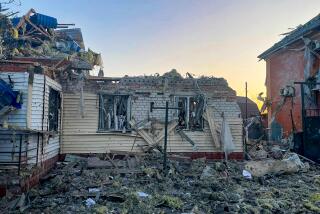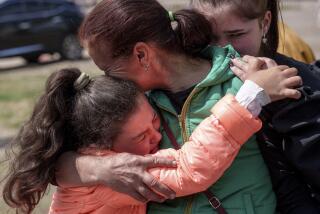Russian Army Wavers; Bombs Pound Grozny
- Share via
MOSCOW — The deputy commander of Russia’s ground forces resigned Thursday rather than take over the 12-day-old assault on Chechnya--a war that reached a bloody apogee with the first daylight bombing of the rebel republic’s capital.
Witnesses in Grozny, the center of Chechen resistance, said they counted at least two dozen bodies after a day of indiscriminate artillery fire and bombs that at one point fell every 30 seconds. An American photographer is among the dead.
Amid reports of a broad shake-up of the Russian Defense Ministry, the government confirmed that Gen. Eduard A. Vorobyov had refused to take command of the army’s stalled, dissent-riven campaign to disarm Chechnya’s few thousand irregular fighters.
“This is an act of a general who doesn’t want to soil his tunic with an immoral deed,” said Sergei Yushenkov, chairman of the Russian Parliament’s Defense Committee.
It was not clear when or if Vorobyov’s resignation would be accepted, but it was the most serious of many signs of insubordination that have slowed the Kremlin’s plan to choke off Grozny with 10,000 or more troops. Dissent on the ground has apparently prompted Russia’s high command to attack from the air for four days in a row.
The result Thursday was the bloodiest since the Russians rolled tanks across their southern border with this tiny Muslim republic Dec. 11 to try to end its three years of self-declared independence. Television images and other reports from Grozny offered scenes of carnage on snow-covered streets.
A dead man’s charred body sat inside his burned car, his hands clutching the wheel. Three corpses, one headless, lay on Red Front Street near the presidential palace beside a truck and four cars wrecked by a single blast. A woman raised her hands in prayer over a dying man in a park as black smoke rose against the horizon.
“Who are they trying to kill?” Larisa Vozlublennaya, a wailing Russian resident of Grozny, asked an Associated Press reporter outside her shattered apartment building.
Several people died when they rushed to witness the damage and help the wounded after an air strike on a residential neighborhood. The plane that had delivered the strike quickly returned and bombed the crowd, journalists reported.
Among those killed by the second bomb was Cynthia Elbaum, a 28-year-old free-lance photographer from New York City who was based in Moscow. She was the first journalist to die since the Russian offensive began.
While civilians ran for cover or fled to the countryside, Russian forces were seen edging their artillery guns closer to Grozny, and Chechen fighters were offering little resistance. Chechen antiaircraft guns, running low on ammunition or out of it, were reported silent for a second straight day.
A Russian government statement, denying witness accounts on the ground, insisted that Russian planes did not bomb Grozny. It claimed that Chechen fighters were simulating air attacks by blowing up their own buildings.
Gen. Dzhokar M. Dudayev, the Chechen president, appeared on television to denounce “the Satanic methods of Russia.” He repeated his offer to negotiate with the Kremlin “without preconditions” but added: “It is better to die in a holy war than be turned into a slave.”
As outrage against the bombings mounted in Russia, President Boris N. Yeltsin rejected an appeal to appear Saturday before a joint session of Parliament. The Itar-Tass news agency said he was working on a peace proposal and would address the nation within a few days.
The offensive, Moscow’s largest since the Soviet invasion of Afghanistan 15 years ago, has divided the government and the armed forces. Opinion polls report most Russians oppose it. Support outside official circles has come mainly from the ultranationalist right.
Despite its overwhelming numbers and the disorganization of Chechen resistance, the Russian army is wavering. At least one field commander has refused to advance on Grozny. Others have criticized the hastily assembled campaign for its poor coordination among army, airborne and Interior Ministry units whose officers had never before worked together. Sixty Russian soldiers have died in the fighting, according to Russian television.
The government denied reports by Tass and the RIA news agency, which have privileged access to military headquarters, that Defense Minister Pavel S. Grachev had taken personal command of the offensive and dismissed five senior generals, including his top deputy, Georgy Kondratyev.
Grachev was in the Russian city of Mozdok, the operation headquarters, reportedly meeting with three of the officers he did or did not fire: Alexei Mityukhin, Vladimir Chirindin and Vladimir Potapov--the top leadership of the North Caucasus Military District, which has been running the war.
Pavel Felgenhauer, well-informed defense correspondent for the Moscow newspaper Sevodnya, said he could not confirm the dismissals but commented that the war is entering a critical phase.
“The motley Chechen units, which do not have any knowledge of modern warfare, and the Russian army, which does not really want to fight, have come together for the battle for Grozny, and no one can tell what will come of it,” he wrote. “After a long sequence of defeats and humiliations, beginning in Afghanistan, the Russian army has reached a point where it might simply refuse to obey orders.”
More to Read
Sign up for Essential California
The most important California stories and recommendations in your inbox every morning.
You may occasionally receive promotional content from the Los Angeles Times.













